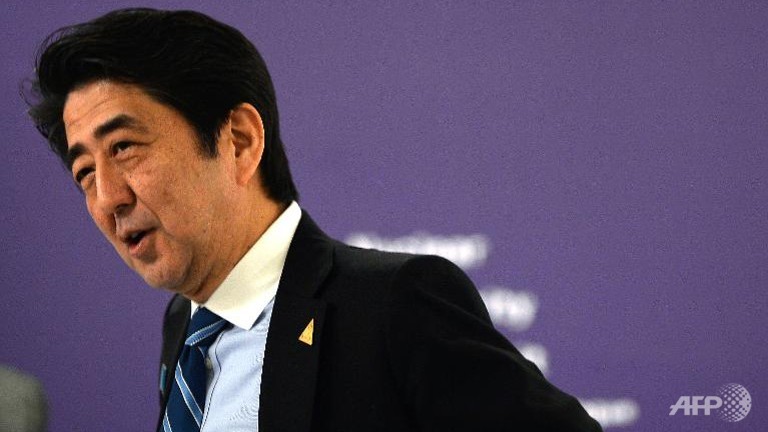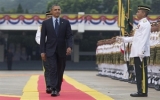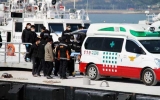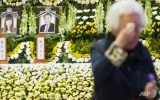Japan PM set for European trade and security trip
Update: 29-04-2014 | 00:00:00
Japanese Prime Minister Shinzo Abe leaves on Tuesday for a six-nation European tour, hoping to move ahead on trade talks and possible security deals at a time when China is flexing its muscles.
The premier's nine-day visit, which will take him to Germany, Britain, Portugal, Spain, France and Belgium, comes less than a week after Japan hosted US President Barack Obama on a state visit.
 Japanese Prime Minister Shinzo Abe is pictured in The Hague. (AFP/Patrik Stolarz)
Despite high hopes, Tokyo and Washington failed to find common ground on a Pacific-wide free trade deal known as the Trans-Pacific Partnership (TPP).
A year ago, the European Union and Japan launched their own trade talks aimed at boosting business between the continent and the world's number three economy, a tie-up that would account for about 40 per cent of global trade.
Officials on both sides say negotiations are moving forward and a deal could be struck before the TPP, with Abe's visit seen as an important diplomatic boost to winning an agreement.
The premier's itinerary includes a Japan-EU summit and lunch with business leaders in Paris. He also has meetings with NATO chief Anders Fogh Rasmussen and Angel Gurria, head of the Organisation for Economic Cooperation and Development.
Earlier this month, Japan lifted a self-imposed ban on weapons exports, introducing new rules covering the arms trade in a move which supporters say will boost Tokyo's global role.
The change comes as Japan is locked in a bitter territorial dispute with China, while regional tensions are high over a possible North Korean nuclear test.
The killing of 10 Japanese workers during a hostage crisis at a remote Algerian gas plant last year has also prompted new security concerns in Tokyo.
"Japan recognises the importance of Europe, particularly in terms of security as we are global partners," a senior Japanese foreign ministry official told AFP on Monday.
Abe, whose trip runs until May 7, will be joined for part of it by Foreign Minister Fumio Kishida.
While Obama's visit underlined Washington's pledge to protect ally Japan in case of military conflict, Abe's trip to Europe is aimed at broadening Tokyo's security ties.
"Clearly, Japan is attaching more importance than before to these issues in its dialogue with European countries -- they're much more visible on his agenda," a European diplomat told AFP on condition of anonymity.
France has already announced a deal to cooperate with Japan in robotics and cyber-defence as well as joint work on advanced helicopters and submarines.
Loosening Tokyo's self-imposed ban on arms exports could, meanwhile, open up commercial opportunities with Europe.
Abe's cabinet approved the plan to replace a 1967 blanket ban, which prohibited arms sales to conflict-plagued countries or nations that could undermine international peace and security.
Japan's post-World War II constitution, imposed by US-led occupiers, banned the country from waging war.
Tokyo is also eyeing a possible security logistics tie-up known as an Acquisition and Cross-Servicing Agreement with European nations. It already has such pacts with the United States and Australia.
- AFP/gn
Japanese Prime Minister Shinzo Abe is pictured in The Hague. (AFP/Patrik Stolarz)
Despite high hopes, Tokyo and Washington failed to find common ground on a Pacific-wide free trade deal known as the Trans-Pacific Partnership (TPP).
A year ago, the European Union and Japan launched their own trade talks aimed at boosting business between the continent and the world's number three economy, a tie-up that would account for about 40 per cent of global trade.
Officials on both sides say negotiations are moving forward and a deal could be struck before the TPP, with Abe's visit seen as an important diplomatic boost to winning an agreement.
The premier's itinerary includes a Japan-EU summit and lunch with business leaders in Paris. He also has meetings with NATO chief Anders Fogh Rasmussen and Angel Gurria, head of the Organisation for Economic Cooperation and Development.
Earlier this month, Japan lifted a self-imposed ban on weapons exports, introducing new rules covering the arms trade in a move which supporters say will boost Tokyo's global role.
The change comes as Japan is locked in a bitter territorial dispute with China, while regional tensions are high over a possible North Korean nuclear test.
The killing of 10 Japanese workers during a hostage crisis at a remote Algerian gas plant last year has also prompted new security concerns in Tokyo.
"Japan recognises the importance of Europe, particularly in terms of security as we are global partners," a senior Japanese foreign ministry official told AFP on Monday.
Abe, whose trip runs until May 7, will be joined for part of it by Foreign Minister Fumio Kishida.
While Obama's visit underlined Washington's pledge to protect ally Japan in case of military conflict, Abe's trip to Europe is aimed at broadening Tokyo's security ties.
"Clearly, Japan is attaching more importance than before to these issues in its dialogue with European countries -- they're much more visible on his agenda," a European diplomat told AFP on condition of anonymity.
France has already announced a deal to cooperate with Japan in robotics and cyber-defence as well as joint work on advanced helicopters and submarines.
Loosening Tokyo's self-imposed ban on arms exports could, meanwhile, open up commercial opportunities with Europe.
Abe's cabinet approved the plan to replace a 1967 blanket ban, which prohibited arms sales to conflict-plagued countries or nations that could undermine international peace and security.
Japan's post-World War II constitution, imposed by US-led occupiers, banned the country from waging war.
Tokyo is also eyeing a possible security logistics tie-up known as an Acquisition and Cross-Servicing Agreement with European nations. It already has such pacts with the United States and Australia.
- AFP/gn
 Japanese Prime Minister Shinzo Abe is pictured in The Hague. (AFP/Patrik Stolarz)
Despite high hopes, Tokyo and Washington failed to find common ground on a Pacific-wide free trade deal known as the Trans-Pacific Partnership (TPP).
A year ago, the European Union and Japan launched their own trade talks aimed at boosting business between the continent and the world's number three economy, a tie-up that would account for about 40 per cent of global trade.
Officials on both sides say negotiations are moving forward and a deal could be struck before the TPP, with Abe's visit seen as an important diplomatic boost to winning an agreement.
The premier's itinerary includes a Japan-EU summit and lunch with business leaders in Paris. He also has meetings with NATO chief Anders Fogh Rasmussen and Angel Gurria, head of the Organisation for Economic Cooperation and Development.
Earlier this month, Japan lifted a self-imposed ban on weapons exports, introducing new rules covering the arms trade in a move which supporters say will boost Tokyo's global role.
The change comes as Japan is locked in a bitter territorial dispute with China, while regional tensions are high over a possible North Korean nuclear test.
The killing of 10 Japanese workers during a hostage crisis at a remote Algerian gas plant last year has also prompted new security concerns in Tokyo.
"Japan recognises the importance of Europe, particularly in terms of security as we are global partners," a senior Japanese foreign ministry official told AFP on Monday.
Abe, whose trip runs until May 7, will be joined for part of it by Foreign Minister Fumio Kishida.
While Obama's visit underlined Washington's pledge to protect ally Japan in case of military conflict, Abe's trip to Europe is aimed at broadening Tokyo's security ties.
"Clearly, Japan is attaching more importance than before to these issues in its dialogue with European countries -- they're much more visible on his agenda," a European diplomat told AFP on condition of anonymity.
France has already announced a deal to cooperate with Japan in robotics and cyber-defence as well as joint work on advanced helicopters and submarines.
Loosening Tokyo's self-imposed ban on arms exports could, meanwhile, open up commercial opportunities with Europe.
Abe's cabinet approved the plan to replace a 1967 blanket ban, which prohibited arms sales to conflict-plagued countries or nations that could undermine international peace and security.
Japan's post-World War II constitution, imposed by US-led occupiers, banned the country from waging war.
Tokyo is also eyeing a possible security logistics tie-up known as an Acquisition and Cross-Servicing Agreement with European nations. It already has such pacts with the United States and Australia.
- AFP/gn
Japanese Prime Minister Shinzo Abe is pictured in The Hague. (AFP/Patrik Stolarz)
Despite high hopes, Tokyo and Washington failed to find common ground on a Pacific-wide free trade deal known as the Trans-Pacific Partnership (TPP).
A year ago, the European Union and Japan launched their own trade talks aimed at boosting business between the continent and the world's number three economy, a tie-up that would account for about 40 per cent of global trade.
Officials on both sides say negotiations are moving forward and a deal could be struck before the TPP, with Abe's visit seen as an important diplomatic boost to winning an agreement.
The premier's itinerary includes a Japan-EU summit and lunch with business leaders in Paris. He also has meetings with NATO chief Anders Fogh Rasmussen and Angel Gurria, head of the Organisation for Economic Cooperation and Development.
Earlier this month, Japan lifted a self-imposed ban on weapons exports, introducing new rules covering the arms trade in a move which supporters say will boost Tokyo's global role.
The change comes as Japan is locked in a bitter territorial dispute with China, while regional tensions are high over a possible North Korean nuclear test.
The killing of 10 Japanese workers during a hostage crisis at a remote Algerian gas plant last year has also prompted new security concerns in Tokyo.
"Japan recognises the importance of Europe, particularly in terms of security as we are global partners," a senior Japanese foreign ministry official told AFP on Monday.
Abe, whose trip runs until May 7, will be joined for part of it by Foreign Minister Fumio Kishida.
While Obama's visit underlined Washington's pledge to protect ally Japan in case of military conflict, Abe's trip to Europe is aimed at broadening Tokyo's security ties.
"Clearly, Japan is attaching more importance than before to these issues in its dialogue with European countries -- they're much more visible on his agenda," a European diplomat told AFP on condition of anonymity.
France has already announced a deal to cooperate with Japan in robotics and cyber-defence as well as joint work on advanced helicopters and submarines.
Loosening Tokyo's self-imposed ban on arms exports could, meanwhile, open up commercial opportunities with Europe.
Abe's cabinet approved the plan to replace a 1967 blanket ban, which prohibited arms sales to conflict-plagued countries or nations that could undermine international peace and security.
Japan's post-World War II constitution, imposed by US-led occupiers, banned the country from waging war.
Tokyo is also eyeing a possible security logistics tie-up known as an Acquisition and Cross-Servicing Agreement with European nations. It already has such pacts with the United States and Australia.
- AFP/gn
 Bulgaria charts new course with Vietnam on President’s upcoming visit: Diplomat
Bulgaria charts new course with Vietnam on President’s upcoming visit: Diplomat
 Seminar seeks ways to boost ASEAN - Latin America connectivity
Seminar seeks ways to boost ASEAN - Latin America connectivity
 Indonesia seeks India's help in health education
Indonesia seeks India's help in health education
 Indonesia named world's most generous country in 2024
Indonesia named world's most generous country in 2024
 Philippines: Over-4m-high floodwaters make thousands of houses submerged
Philippines: Over-4m-high floodwaters make thousands of houses submerged
 Singapore’s public sector records carbon reduction in 2023
Singapore’s public sector records carbon reduction in 2023
 Pressure facing the EU on its growth track
Pressure facing the EU on its growth track
 Efforts boosted to combat transnational organised crime
Efforts boosted to combat transnational organised crime
 Nearly 200 terror suspects arrested in Indonesia in two years
Nearly 200 terror suspects arrested in Indonesia in two years
 Vietravel launches tourism joint venture in India
Vietravel launches tourism joint venture in India



